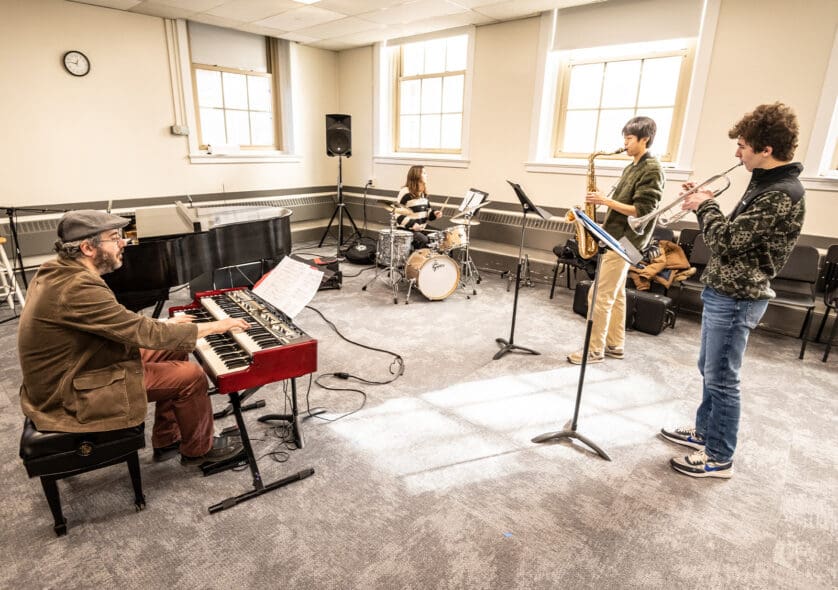Whether you’re strumming to the beat of your own drum or jamming with a group of musical misfits, being a part of a guitar ensemble is a unique experience filled with equal parts harmony and chaos. With the right mix of talent, practice, and a touch of sheer luck, you can turn your ragtag group of rockstar wannabes into a well-oiled guitar machine. So grab your picks, tune up your strings, and get ready to rock and roll, because we’ve got the tips you need to conquer the world of guitar ensemble success.
Contents
- 1 Establishing a Cohesive Vision for Your Ensemble
- 2 Navigating the Challenges of Group Dynamics in Music
- 3
- 4 Arranging Pieces for Diverse Skill Levels within the Ensemble
- 5 Fostering Individual Talents Towards a Collective Sound
- 6 Incorporating Feedback and Critique for Continuous Improvement
- 7 Embracing Technology and Innovation in Rehearsal Techniques
- 8 FAQs
- 9 Rock on, Guitarists!
Establishing a Cohesive Vision for Your Ensemble
When it comes to , it’s important to ensure that everyone is on the same page – literally! Here are a few tips to help your group harmonize and create a united front:
First and foremost, **communication** is key. Make sure that all members of your ensemble are clear on the goals and direction of your group. Encourage open dialogue and collaboration to ensure that everyone’s voice is heard.
Next, **set clear expectations** for your ensemble members. Whether it’s about rehearsal schedules, performance attire, or musical style, make sure that everyone knows what is expected of them. This will help to avoid any discord within the group.
Don’t be afraid to **think outside the box** when it comes to creating a vision for your ensemble. Consider experimenting with different genres of music, incorporating unique performance elements, or even changing up the traditional structure of your group. Creativity is key!
Remember, a cohesive vision doesn’t happen overnight. It takes time, effort, and a lot of practice. But with patience and dedication, your ensemble can create something truly special that resonates with both your members and your audience.

When it comes to , it’s like trying to play a duet with someone who keeps changing the sheet music halfway through the song. You never know what unexpected note or tempo change is going to throw off the entire performance!
One of the biggest hurdles in group dynamics is trying to find a balance between individual creativity and group cohesion. It’s like trying to find harmony in a cacophony of ego solos - not an easy task! To combat this, it’s important to encourage everyone to contribute their unique ideas while also working together towards a common goal.
Communication is key when it comes to group dynamics. Without clear and open communication, it’s like trying to play a symphony without a conductor. Things can quickly spiral into chaos! Make sure everyone is on the same page by having regular check-ins and addressing any issues or concerns as they arise.
Remember, group dynamics in music are like a well-coordinated dance – it takes practice, patience, and a whole lot of flexibility. Embrace the challenges as opportunities for growth and learning, and before you know it, you’ll be hitting all the right notes together!

precision-in-timing-the-backbone-of-harmonious-performance”>Precision in Timing: The Backbone of Harmonious Performance
When it comes to pulling off a flawless performance, timing is everything. Imagine a synchronized dance routine where one dancer jumps too early or a comedy act where the punchline is delivered too late – disaster! That’s why precision in timing is the secret to harmonious performance.
Just like a well-oiled machine, every moving part in a performance needs to be perfectly synced up for it to run smoothly. From musicians hitting the right notes at the exact moment to actors delivering their lines with impeccable timing, it’s all about finding that sweet spot where everything falls into place.
Think of timing as the conductor of an orchestra, directing each section to play their part at just the right moment. Without this guiding force, chaos would ensue and the performance would be nothing but a cacophony of noise.
So next time you’re preparing for a performance, remember that precision in timing is the backbone of success. Practice, rehearse, and fine-tune until every element of your act is perfectly in sync. It may take some extra effort, but the end result will be a harmonious masterpiece that leaves your audience in awe.

Arranging Pieces for Diverse Skill Levels within the Ensemble
When it comes to arranging pieces for an ensemble with diverse skill levels, there are a few strategies you can employ to ensure that everyone feels challenged and included. Here are some tips to help you navigate this musical minefield:
First and foremost, **know your musicians**. Take the time to understand each player’s strengths and weaknesses so you can assign parts that are appropriate for their skill level. You don’t want to give the lead violin solo to someone who has only been playing for a few months (unless you enjoy the sound of screeching strings).
Consider creating **different versions of the same piece**. For example, you could have a simplified arrangement for beginners and a more complex version for more advanced players. This way, everyone can participate and no one feels left out. Plus, it adds a layer of challenge for those who are up for it.
**Mix and match**. Don’t be afraid to shake things up and have players switch parts occasionally. This can help keep things interesting and give everyone a chance to try something new. Who knows, the flute player might discover a hidden talent for the trombone!

Fostering Individual Talents Towards a Collective Sound
Are you tired of being the only one jamming out in the shower to your favorite tunes? Fear not, because we are here to help foster your individual talents and bring them together to create a harmonious collective sound that will have everyone grooving!
With our unique approach to talent development, we will help you fine-tune your musical skills and discover hidden talents you never knew you had. From rocking out on the air guitar to belting out the high notes, our team of experts will guide you every step of the way.
Join our community of aspiring musicians and let the magic happen as we blend your individual talents together to create a one-of-a-kind sound that will have everyone talking. Who knows, you might just become the next big sensation!
Don’t let your musical talents go to waste. Join us on this epic journey of self-discovery and let’s create music that will make the world stop and listen!
Incorporating Feedback and Critique for Continuous Improvement
So you’ve received feedback and critique on your work – congratulations! Now it’s time to put that feedback to good use and make some improvements. Here are some tips to help you incorporate feedback for continuous improvement:
Listen with an open mind: It can be hard to hear criticism, especially when you’ve poured your heart and soul into a project. But remember, feedback is a gift – even if it’s wrapped in a slightly passive-aggressive email. Take the feedback on board and try not to take it personally. After all, it’s not like they’re critiquing your childhood finger painting.
Identify common themes: Do you keep hearing the same critique over and over? Maybe it’s time to admit that maybe your obsession with glitter unicorns might not be resonating with your audience. Look for patterns in the feedback and use that as a guide for improvement.
Take actionable steps: Don’t just nod along and say “yeah, I’ll totally work on that” without actually doing anything. Make a plan for how you’re going to address the feedback. Whether it’s revamping your website or holding off on the glitter unicorns for a while, take concrete steps towards improvement.
Embracing Technology and Innovation in Rehearsal Techniques
Technology has revolutionized the way we rehearse, making it easier and more fun than ever before. From virtual reality programs that transport you to a different time or place, to software that helps you harmonize with yourself, there are endless possibilities for embracing innovation in your rehearsal techniques.
One of the most exciting developments in rehearsal technology is the use of digital sheet music. No more lugging around bulky binders or losing your place in the music - with digital sheet music, you can easily scroll through pages, make notes, and even transpose on the fly. Plus, you’ll never have to worry about forgetting your music again - it’s all stored safely on your device!
Another fantastic tool for enhancing your rehearsals is the use of recording software. Whether you’re looking to make demos of your arrangements, track your progress over time, or simply record a practice session for feedback, recording software is a versatile and indispensable resource for any musician. Plus, you can easily share your recordings with bandmates or collaborators for instant feedback.
And let’s not forget about the power of social media in connecting with your audience and promoting your rehearsals. From live streaming rehearsals on platforms like Facebook or Instagram, to creating behind-the-scenes content for your fans, social media can be a powerful tool for building excitement and engagement around your musical projects. So go ahead, embrace technology and innovation in your rehearsal techniques – the possibilities are endless!
FAQs
Will practicing individually help improve our guitar ensemble performance?
Absolutely! Just think of it as sharpening your own sword before joining the epic battle of music with your ensemble comrades.
How can we ensure everyone stays in sync during our performances?
Communication is key! Make sure you’re all on the same page – or in this case, the same measure – to avoid any musical mishaps.
What should we do if someone in the ensemble is struggling with a particular part?
Don’t fret! Offer your support and help them out. Remember, a chain is only as strong as its weakest link, so strengthen that link together.
What are some strategies for making our guitar ensemble performances more engaging for the audience?
Don’t just play the music, feel the music! Put on a show, interact with each other on stage, and dazzle the audience with your musical prowess.
How can we handle disagreements or conflicts within the ensemble?
No need for a guitar showdown! Work it out like the rockstars you are – through open communication, compromise, and a healthy dose of good-natured banter.
Rock on, Guitarists!
Congratulations on conquering the guitar ensemble world! With these tips in your back pocket, you’ll be shredding like a pro in no time. So keep practicing, keep jamming, and most importantly, keep those fingers flying. Rock on, guitarists!



